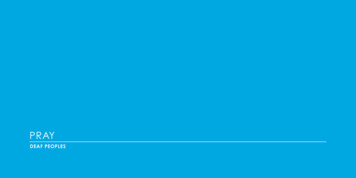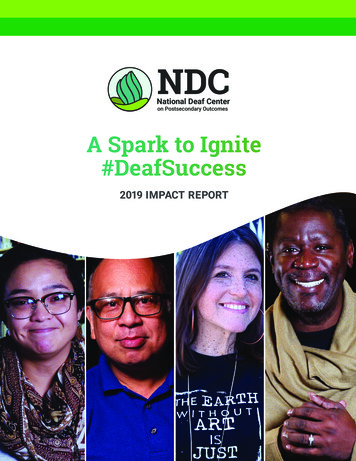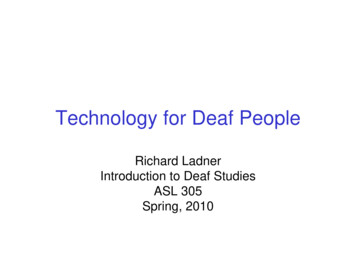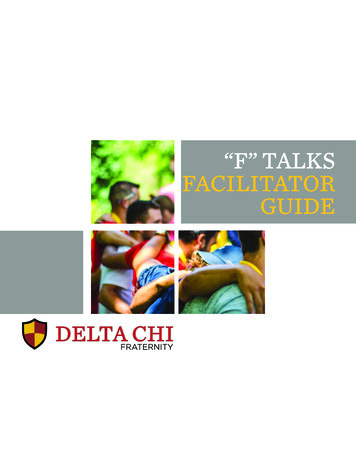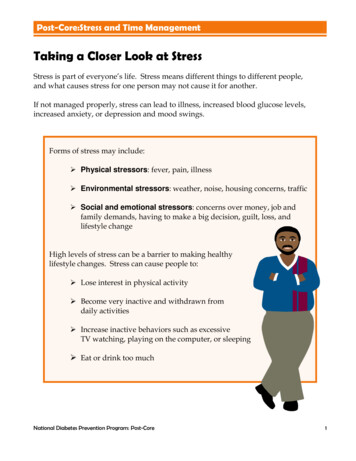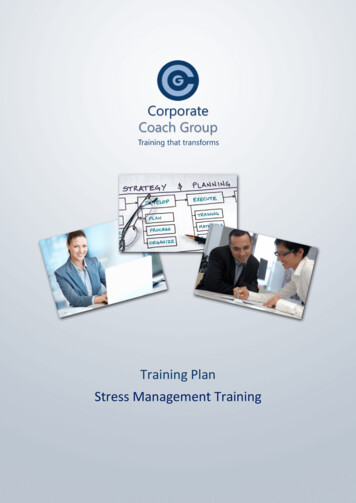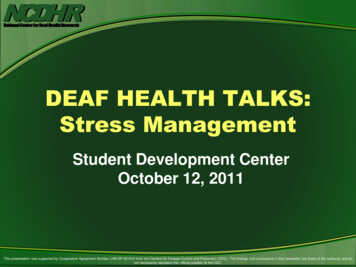
Transcription
DEAF HEALTH TALKS:Stress ManagementStudent Development CenterOctober 12, 2011This presentation was supported by Cooperative Agreement Number U48-DP-001910 from the Centers for Disease Control and Prevention (CDC). The findings and conclusions in this newsletter are those of the author(s) and donot necessarily represent the official position of the CDC.
Supporters National Center for DeafHealth Research (NCDHR) Matthew Starr and Michael McKee Student Life Team
So What is Stress? Normal response to demands of life! Both positive and negative situations “Fight or Flight” response Varies depending on individual What’s important is how you deal with it
“Stress is the condition weexperience when demandsexceed our ability to cope.”MayoClinic.com
What are some commonstressful experiencesyou have in college?
Common StressfulEventsEustress: Positive Getting into college Anxiety before a test Anxiety before first date Getting engaged Scary movie Excitement of roller coaster ride Strength before a sports game
Common StressfulEventsDistress: Negative Difficult educational environment Overwhelming sights and sounds Overwhelming schedule andobligations Threat of personal injury Death of family member Sleep problems Relationship problems
General Stress Everyone experiences this Usually resolves within short time frame No intervention necessarily required
Cumulative Stress Effects of stress builds up in your body Becomes more difficult to lessensymptoms Physical symptoms might be more serious Mental suffering might be more serious
Acute Traumatic Stress Critical incident stress from sudden andunexpected events Produces considerable psychologicaldistress A normal reaction to abnormal events
Post Traumatic Stress Severe stress produced by severepsychological trauma Created by unresolved critical incidentstress Produces lasting changes
StressHormonesHubert et al. (1993) Cortisol – primary stress hormone Increases: sugars in blood & brain’s use of it, ability to repair tissues Decreases: immune response, digestive system, reproductive system, growthprocesses Adrenaline (Epinephrine and Norepinephrine) – increases heart rate, bloodpressure, energy
ShortTermSymptoms Dry mouth Cool skin, cold hands & feet Increased sweating Rapid breathing Faster heart rate Tense muscles, stress headache Upset stomach Diarrhea Frequent urination
LongTermSymptoms Sleep problems - insomnia Change in appetite Change in sex drive Aches and pains Prone to illness, frequentcolds Feelings of intense and longterm tiredness
ess-signs
Effects of ChronicStress on the BodyThis puts you at increased risk of numeroushealth problems, including: Heart disease Sleep problems Digestive problems Depression Obesity Memory problems Worsening of skin conditions, such aseczema
Unhealthy Ways ofCoping Smoking tobacco Sleeping too much Overeating or undereating Procrastinating Social withdrawal Avoiding facing problems Drug or alcohol abuse Angry outbursts
Did YouRealize?Many addictions are linked to a stressful lifestyle, likeovereating, smoking, drinking, and drug abuse.These are used as an escape or a temporary way but theproblem or stressor is still there!
WhatHelps?1.2.3.4.5.6.RelaxationRegular ExerciseEating RightLimiting alcohol to 1 or 2 drinks a dayStop smoking – tobacco is really a stimulant!Cut back on caffeine – 2 to 3 cups a day is usually OK
Short(8oz.)Tall(12oz.)Grande(16oz.)Venti(20oz.)1 cup 8 ounceshttp://coffeecupnews.org/starbucks-grande/
Serenity Prayer:God grant me the serenityto accept the things Icannot change;courage to change thethings I can;and wisdom to know thedifference.
How do you know you’reSTRESSED? Headaches Yawning Fiddling Nail biting Grinding teeth Pacing Over reacting Irrational Emotional Critical
Some Facts. According to the American Academy of FamilyPhysicians, two-thirds of office visits to family doctors arefor stress-related symptoms. In a recent poll, 89% of people said they hadexperienced serious stress in their lives. A recent study indicated that stress-managementprograms may reduce the risk of heart problems, includingheart attack, by up to 75% in people with heart disease.
SupportAvailableRIT Counseling /Deaf Wellness Center at nter/
OtherStrategies Better time management Being organized with tasks Being realistic with expectations Look for the upside Deep breathing exercises (seeattachment!) Meditative exerciseso Prayero Leisure readingo Socializing with supportivefriends and family Weight-lifting, yoga
ChairLowerBackStretch
DownwardFacingDog
ChairCorpsePose
Knees toChest
SeatedSpinalTwist
ChildsPose
CobraPose
WarriorOnePose
ExtendedTrianglePose
StandingForwardBend
TreePose
Sukhasana(EasyPose)
ProgressiveMuscleRelaxation Right foot Left foot Right calf Left calf Right thigh Left thigh Hips and buttocks Stomach Chest Back Right arm and hand Left arm and hand Neck and shoulders Face
Resources 00008 D http://www.helpguide.org/mental/stress relief meditation yoga relaxation.htm http://www.helpguide.org/mental/stress management relief coping.htm http://ehealthmd.com/library/stress/str whatis.html MY00435
Resources ith-yoga/ c focus/t stress http://www.mayoclinic.com/health/stress/SR00001 http://www.mentalhelp.net/poc/view doc.php?type doc&id 15644 ises-women?cat 24164&tip 24169 Canton Counseling Center
THANK YOUSign up for our e-mails if you would like to getinvolved with NCDHR as a community partner!1. Go to www.urmc.edu/NCDHR2. Click on icon on right side of page3. Fill in your name and e-mail addressFind us on FaceBook & Twitter (@DeafHealthNCDHR)!
Scary movie Excitement of roller coaster ride Strength before a sports game . o Prayer o Leisure reading o Socializing with supportive friends and family . Downward Facing Dog . Chair Corpse Pose . Knees to Chest . Seated Spinal Twist . Childs Pose . Cobra Pose . Warrior One Pose . Extended Triangle Pose . Standing Forward Bend .


